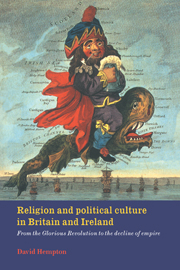 Religion and Political Culture in Britain and Ireland
Religion and Political Culture in Britain and Ireland Book contents
- Frontmatter
- Contents
- Preface
- 1 The Church of England: a great English consensus?
- 2 The Methodist revolution?
- 3 Evangelical enthusiasm and national identity in Scotland and Wales
- 4 The making of the Irish Catholic nation
- 5 Ulster Protestantism: the religious foundations of rebellious Loyalism
- 6 Religion and political culture in urban Britain
- 7 Religion and identity in the British Isles: integration and separation
- 8 Conclusions
- Select bibliography
- Index
1 - The Church of England: a great English consensus?
Published online by Cambridge University Press: 06 January 2010
- Frontmatter
- Contents
- Preface
- 1 The Church of England: a great English consensus?
- 2 The Methodist revolution?
- 3 Evangelical enthusiasm and national identity in Scotland and Wales
- 4 The making of the Irish Catholic nation
- 5 Ulster Protestantism: the religious foundations of rebellious Loyalism
- 6 Religion and political culture in urban Britain
- 7 Religion and identity in the British Isles: integration and separation
- 8 Conclusions
- Select bibliography
- Index
Summary
It has been unusually difficult for historians to offer satisfactory organising principles for the study of religion in British society in the long eighteenth century (c. 1689–1832). One reason for that is that many of the dominant historiographical traditions of the eighteenth-century Church had their origins in the period of constitutional revolution between 1828 and 1835 when the terms under which the Established Churches in Britain operated were forever altered. The ideologues of the early Oxford Movement and enthusiastic evangelicals had much in common in decrying both the theory and practice of Whig erastianism which in their view had spiritually impoverished the Church by subjecting it to political manipulation through lay-controlled patronage. Similarly, both Nonconformists and anticlerical radicals had a vested interest in exposing establishment defects, especially those occasioned by excessive wealth and pastoral neglect. Even those as ideologically far apart as Irish Catholics and utilitarian radicals regarded the episcopal Established Churches of the eighteenth century as bulwarks of unmerited privileges enjoyed by the few against the legitimate interests of the many. Hence many treatments of religion in this period are dominated by either attacks or defences of Established Churches in which moral judgements often take the place of realistic assessments of how churches could be expected to operate in an eighteenth-century setting.
An equally important historiographical problem to be aware of is that assessments of the Church of England in particular often depend on whether a date of c. 1740 is chosen as the start or the end of a period of study.
- Type
- Chapter
- Information
- Religion and Political Culture in Britain and IrelandFrom the Glorious Revolution to the Decline of Empire, pp. 1 - 24Publisher: Cambridge University PressPrint publication year: 1996


